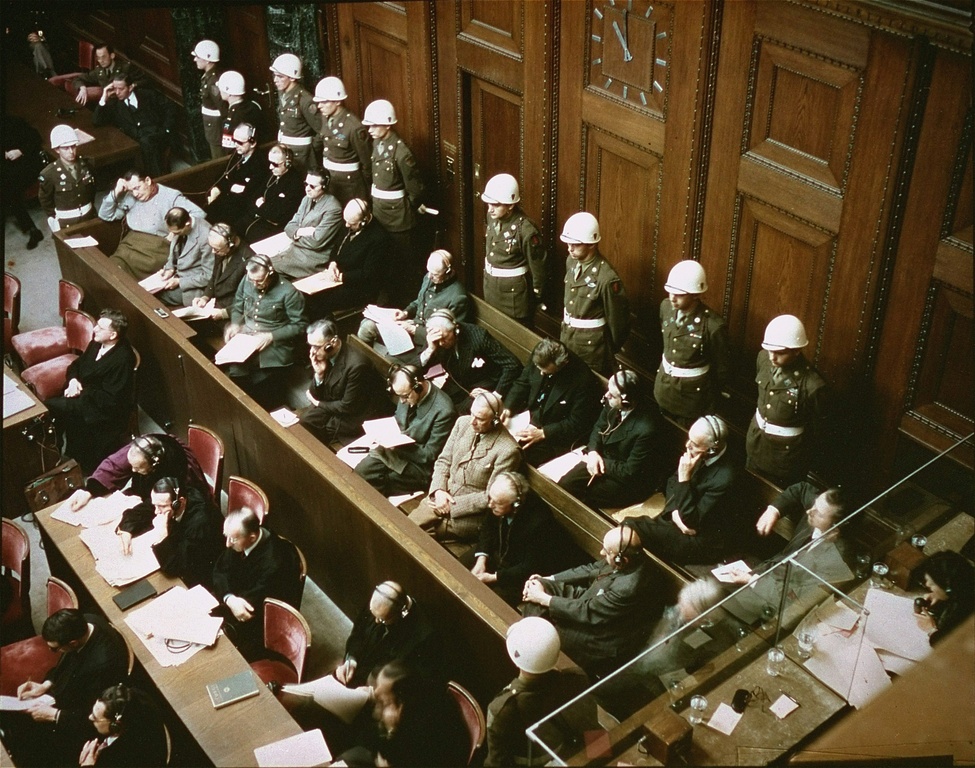
Today (20/11/2025) marks the 80th anniversary of the opening of the International Military Tribunal (IMT) in Nuremberg, Germany. The IMT was the first and largest of the trials held after the Second World War to prosecute crimes perpetrated by the Nazi regime, and it was the only one to be led jointly by the four victorious Allies¾Britain, France, the Soviet Union, and the USA.
During the war, Allied leaders had made a number of promises that those who had committed crimes and atrocities in the name of Nazi ideology would face justice once the war was over. Winston Churchill had initially argued that the principal leaders of the Third Reich should face summary execution, rather than a formal trial, but he later abandoned this position.
Crucially, the Allies were keen to demonstrate that the system they had ostensibly fought for¾democracy, liberty, and justice¾was superior to that of the tyranny which thousands had lost their lives to vanquish. One way of doing that was to grant the Nazi leaders a "fair" trial and show the international community the importance of the rule of law.
In 1943, Churchill, along with Joseph Stalin and Franklin D. Roosevelt, signed the Moscow Declaration on Atrocities which affirmed that Nazi criminals who had committed atrocities on another country’s territory would be sent back to those countries after the war to face trial. Those perpetrators whose crimes were not geographically limited (especially the Third Reich’s key leaders) would be tried by a joint Allied court.
This Declaration then formed the basis of the London Charter, the legal instrument which underpinned the IMT. An entirely new framework of international law had to be drawn up, especially to prosecute crimes conducted by the German government against German citizens (including Jews). This gave rise to a new term¾"crimes against humanity"¾which sat alongside "crimes against peace" and "war crimes" on the charge sheet.
With this basis established, the IMT opened in the Palace of Justice in Nuremberg on 20 November 1945. There were twenty-four defendants, though one (Robert Ley) committed suicide shortly before the trial began and another (Wilhelm Krupp) was too ill to stand trial. A third (Martin Bormann) was tried in absentia as he had not been captured and, unbeknownst to prosecutors, was already dead.
Many of the other most prominent Nazis¾Adolf Hitler, Joseph Goebbels, Heinrich Himmler¾had taken their own lives at the end of the war, but the defendants selected still represented the seniormost levels of the Third Reich’s government and economic structures. Perhaps the most notorious defendant was Hermann Goering, head of the Luftwaffe, and Hitler’s second-in-command for much of the Nazis’ time in power.
The IMT sat for almost a year, with the trial concluding on 1 October 1946. Of the twenty-two defendants who were actually tried, twelve were sentenced to death. Ten of those were hanged on 16 October; Goering escaped the noose by taking a cyanide pill in his cell the night before his scheduled execution, and Bormann’s sentence was merely symbolic. Seven were sentenced to jail terms of varying lengths, to be served at Spandau Prison in Berlin, and three were acquitted.
Both at the time and since, the IMT has come in for considerable criticism. While efforts were made to give proceedings the veneer of a fair trial, many felt it represented little more than "victor’s justice", or even vengeance in disguise. Some also questioned whether the Allies really had the moral authority to judge Nazi Germany, especially given the Soviet Union’s own record of atrocities and oppression.
Disputes among the Allies were also an issue and, as a result, the IMT was the only four-power tribunal which was held. Instead, each of the Allies embarked on their own programmes of post-war trials in the years that followed, as did other countries, such as Poland and, once they regained independence, East and West Germany.
In spite of the criticism, and the fact that the four-power tribunal system did not continue, the first Nuremberg Trial was a hugely significant historical event. It introduced an entirely new language of international law, especially the term "crimes against humanity", and set a precedent which still stands today, most notably in the form of the International Criminal Court in The Hague. Above all it helped to bring the full extent of Nazi crimes to light, forcing us to grapple with the nature of modern tyranny.
If you want to explore investigations into Nazi crimes in more detail, British Online Archives has a fascinating collection titled Prosecuting the Holocaust: British Investigations into Nazi Crimes, 1944–1949. Comprising over 180,000 images drawn from files at The National Archives (UK) and the United States Holocaust Memorial Museum, this collection provides a detailed account of British efforts to bring Nazi criminals to justice after the Second World War. Visit the collection page to learn more
